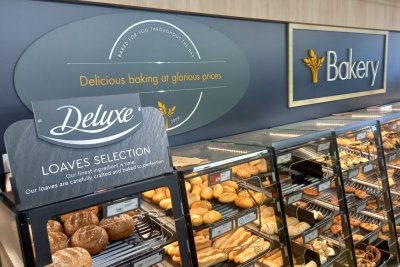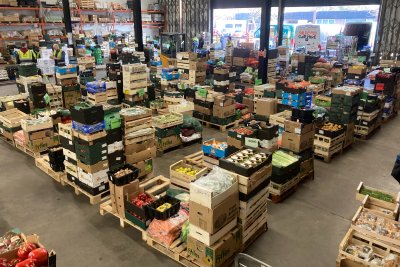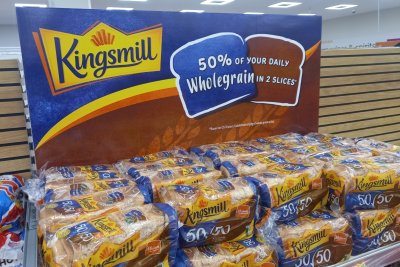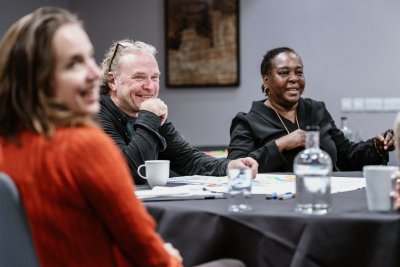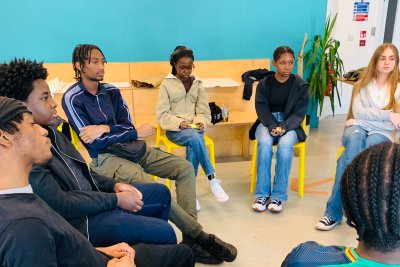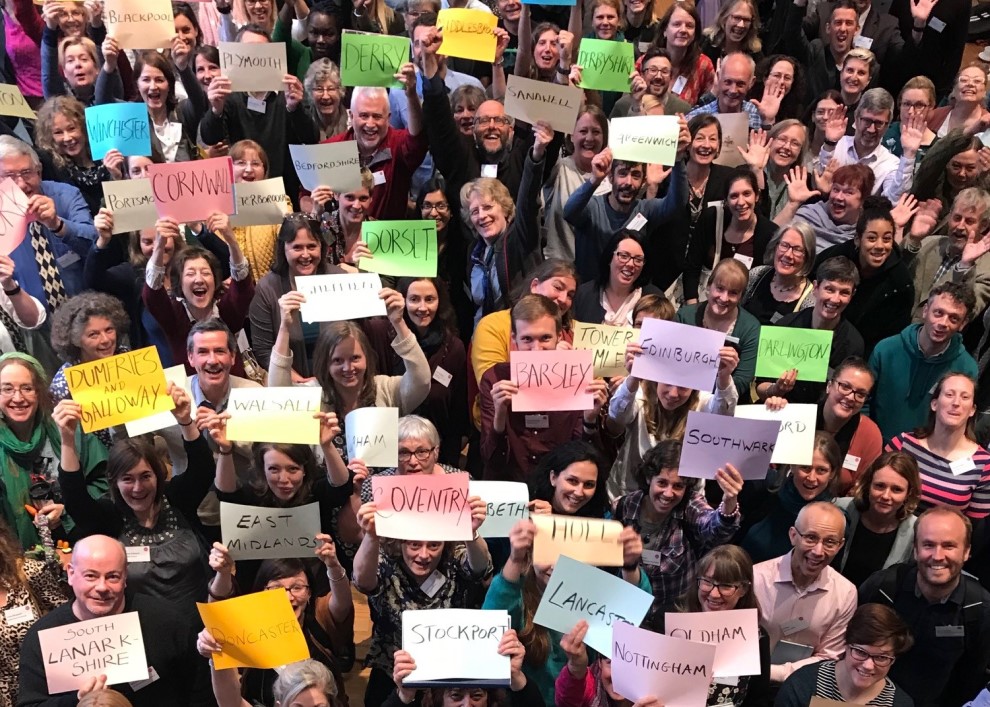 Attendees at the June 2019 Sustainable Food Cities conference in Newcastle. Photo credit: Tom Andrews
Attendees at the June 2019 Sustainable Food Cities conference in Newcastle. Photo credit: Tom Andrews
Sustainable Food Cities can join up local and national food strategies - a powerful force for change
Sustain's chief executive Kath Dalmeny reflects on the positive impact of the Sustainable Food Cities network, and the opportunities to join up local action with the new National Food Strategy.
This is a transcript of the opening address that given at the Sustainable Food Cities national conference in Newcastle, June 2019. She responded to a film from former UN Special Rapporteur on the Right to Food, Olivier de Schutter, who talked about the sustainable food cities movement internationally, and the gravity of the work that needs to be done (visit the Sustainable Food Cities conference write-up to view the film). Sustain's chief executive Kath Dalmeny responded:
It is so good to be with you all today. I think the Sustainable Food Cities conference is one of the most important food system gatherings of the year. It’s like an enormous wedding, with all the people and initiatives you love in one room.
I liked what Olivier de Schutter said in his film, and I agree with everything he said; he’s so often the light to guide our way. Actually, I did disagree with one thing he said, but I will leave that to the end, I’ll come back to it.
Olivier de Schutter said that cities have become the “centre of gravity” for the urgent shift to sustainable food systems. Let’s think about that word “gravity”. I’m going to go back to my O Level in physics for a moment, hopefully more successfully than the first time around!
Gravity is something invisible that draws us together. We can’t pull away. We are naturally drawn by a force that attracts us. We are pulled into orbit. We have our feet planted on the ground, in the soil, and the ground holds us up. So what draws us together here? I would say that everyone in this room “gets it”. [I want to say thank you to Jamie Sadler from Food Newcastle, we sat next to each other last night at the dinner, and agreed that we most like to work with people who “get it”.]
What do we “get”? What is our gravity? What draws us together is the natural instinctive understanding that food is the staff, the stuff of life. That when each mouthful of our food is wrong, then we are supporting damaging farming, the loss of songbirds, isolated lives, furred-up arteries and a catastrophically warming planet. But when each mouthful of our food is right, then we are connected to our planet, pulled back to common sense. Good food means that bees can thrive. That children can flourish. Good food creates friendships. It creates the social gravity that brings farmers into markets; older people into a social kitchen for a chat and a decent meal; procurement specialists into a room to discuss how to buy wildlife-friendly local food; and Sustainable Food Cities conference delegates into the Tyne Bank Brewery last night. Thank you, Food Newcastle, for all that you do and for your wonderful welcome!
As we meet, ten people are vying to be the next Prime Minister of our country. Every single one of them has claimed that they will bring the country together. Yet in the food system, the apparent solutions they offer are so often divisive, splitting families and communities – literally in the case of the Universal Credit cap that often forces people to move away from their homes and support systems. The “private interests” that Olivier de Schutter just said “hijack” our national government and policy make our land too expensive for new entrant farmers and small-scale fruit and veg growers. Those “private interests” move at a snail’s pace on making food healthier, and actively resist regulation, because highly processed food is just so darned profitable. And those “private interests” will be never more evident than when the UK starts to be an independent trading nation post-Brexit, with our food standards up for grabs.
Apologies, I don’t want to get too political.
No. Sorry, that’s not right. I’ve brought the wrong notes.
I DO want to get political.
Olivier de Schutter said that cities have become the centre of gravity for the urgent shift to sustainable food systems. Let’s think about a second meaning of the word “gravity”. We use the term gravity to mean weighty, heavy, serious. There are some pretty serious issues that we must address, working together.
I read this wonderful little book on the train on the way up to Newcastle. It’s by Greta Thunberg, the 16-year-old Swedish schoolgirl who went on school strike every Friday to get the world to wake up to climate change. It is the transcripts of her speeches to leaders around the world, from the Pope to the European Parliament, to our own MPs and leaders. Bless Greta. We must acknowledge the burden she and her generation now bear. Hundreds of thousands of schoolchildren are following her lead. Extinction Rebellion have been on the streets.
Several cities in this network have declared a climate emergency. I believe that should be a climate and nature emergency. This is the "gravity" of the issues we must face up to.
I spent an afternoon with the Fairtrade Foundation a couple of weeks ago, helping their staff to think through what it means to support the farmers they work with, who are already facing some of the first impacts of climate change. Drought. Crop failures. Little social safety net to pick up the pieces. Sobering stuff. We agreed in that room that we can't look away from the shadow, nor go into denial. We have to hold the shadow, acknowledge it, step up to its challenges and not walk alone.
And we are not alone. Our network proves it. Food has a gigantic role to play in creating a fair transition to a better way of living, with everyone enjoying their basic human right to food, and farmers - at home and abroad - enjoying their basic human right to be able to make a decent living out of feeding us. Cities are understandably preoccupied with energy and transport – installing the big kit that will directly reduce carbon and make air cleaner to breathe for everyone. We need to put food central to that agenda. We can learn a lot from how the green transport sector has presented the rapid transition to electric vehicles as both a planetary and public health priority, worthy of serious investment. People accept and promote transport changes because they will get clean air.
But what about the soil, the land, the food growers, the trees, the bees? We need to rapidly accelerate all the fantastic initiatives represented in this room, that make a market for food that is grown sustainably, accessible to everyone. Cities are the major market for food, and urban dwellers are pretty good at urban things like distribution, marketing, procurement and moving money around. We need to be making that money really work for a net zero carbon future, and for a bee-friendly, farmer-friendly, artery-friendly future. We can get so much better at organising ourselves so that the city supports the right kind of food production. Agro-ecological food production, and more fruit, vegetables, nuts and pulses. I would love to think that in a next phase of Sustainable Food Cities, we could really come to grips with that, at scale. And to tackle head on the economics of doing so.
My final thought on the subject of “gravity” is that it’s all very well us recognising the urgent need for all of these things. But to do so, we need the political will, the money flows and the powers to be able to enact serious change, at a serious scale. This makes me think about devolution of powers to cities and regions, to enable much better local ownership, local democracy and intervention, on behalf of local citizens. This makes me think seriously about what more we can do to challenge private interests that are not yet working in favour of the food future we need. This makes me think about the central role of local authorities in facilitating change, and how austere budget cuts undermine our capacity to respond. This makes me think about the £6bn or more that will be repatriated to the UK after Brexit from EU structural funds and what that will be spent on. Work such as that of the Sustainable Food Cities network deserves to be invested in. This makes me think about national policy.
In June, I have been invited to a 'food systems dialogue' with Henry Dimbleby, one of the non-executive directors of Defra, who has been appointed by Defra Secretary of State Michael Gove to develop a National Food Strategy. The National Food Strategy process itself will be launched very shortly. The commitment I’d like to make to you today is that I’m here at this conference to listen. I often think that my role in going to government meetings and national consultations is to take a door with me. And then wedge it open so that others can walk through. So I want to take a door for you, my friends and colleagues in the Sustainable Food Cities, into that room and say, “Help this wonderful work to thrive. Make it possible and easier for a hundred Jamie Sadlers to be running Food Newcastles – and their equivalents across the country who so profoundly “get it” – as you all do – to help transform the food system."
One final comment. I said at the beginning there was one thing that I disagreed with in Olivier de Schutter’s film. It is this.
Olivier said “All of these initiatives have often flourished as a result of the voluntary time committed by ordinary women and men who have dedicated their energy and enthusiasm to developing these social innovations to transform the food system.”
I agree with all of that - of course I do. But the word I object to in that sentence is “ordinary”. “Ordinary” women and men?! I really can’t agree. I think you are extraordinary. And I think it’s about time we make sure that more people and policy-makers know it.
Sustainable Food Places: Network bringing together over 100 local food partnerships.
Sustain
The Green House
244-254 Cambridge Heath Road
London E2 9DA
020 3559 6777
sustain@sustainweb.org
Sustain advocates food and agriculture policies and practices that enhance the health and welfare of people and animals, improve the working and living environment, promote equity and enrich society and culture.
© Sustain 2025
Registered charity (no. 1018643)
Data privacy & cookies
Icons by Icons8

